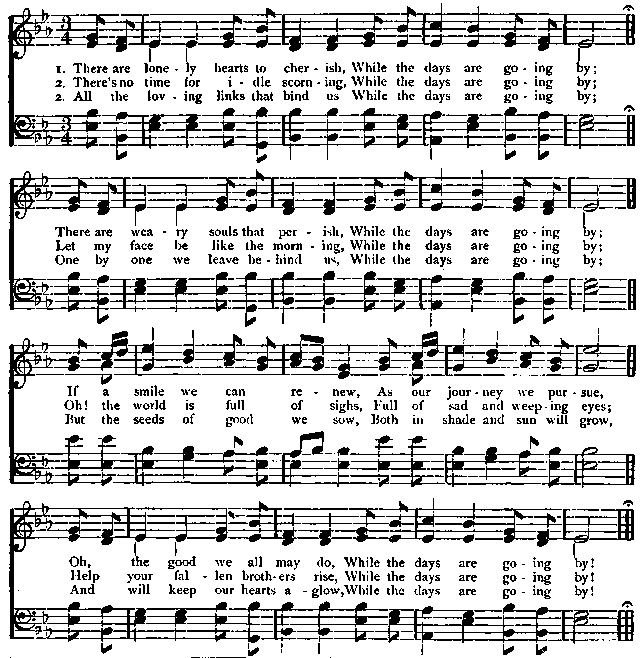Franklin Square Song Collection - online songbook
200 favorite songs and Hymns for Schools, Homes Lyrics & Sheet Music
| Share page | Visit Us On FB |
|
74 |
FRANKLIN-SQUARE SONG COLLECTION. |
||||
|
Thro' the Dark Ages music was kept alive mainly by tradition. In the churches its religious element preserved it, while the minne-singers and troubadours, singing of rare knightly deeds, made it an essential accomplishment for those who sought welcome in courts and palaces. Yet to the meister-singers rather than the minne-singers do we owe that which was best worth preserving, the popular element in music, since a language, an art, a religion, to live, must have its abiding-place, its shrine, among the homes and in the hearts of the people. The guilds of the meister-singers were established in the chief cities of |
Germany, Nuremberg the chief, and chiefest in Nuremberg was Hans Sachs, the shoe-maker, whose name is famous the world over, even without Herr Wagner's opera of Die Meistersinger. Those who have seen Kaulbach's cartoon of the "Era of the Reformation" will recall with pleasure the strong, earnest face of the musical cobbler, with whom Luther himself must share some of his glory. The resistless weight and influence of these guilds came from their genuiue democracy. Numbering neither knights nor nobles in their ranks, but recruited from the burghers, tradesmen, craftsmen, and plain citizens, they brought corn- |
||||
|
WHILE THE DAYS ARE GOING BY. |
A. Nettleton. |
||||
|
|
|||||
 |
|||||
|
|
|||||
|
mon-sense in close contact with learning; they sang at the workshop and the forge, at the cobbler's bench and at the loom. Not alone in church, but at home and abroad, music was a bond of union, interwoven with their religious aspirations; it was also their recreation, with a good share of hard, earnest work and careful training, in obedience to strict rules and regulations, under skillful leaders, to make their music possible. It was these meistersingers which made Germany a musical people, ready for Luther's hymns, to -which, indeed, music gave wings, doing more than |
even the great reformer's preaching for the spread of Gospel truth: so simple and effective are some of the great agents of God. Music had at last become the people's possession; not alone a source of enjoyment and gratification to the refined and cultivated, but a mighty means for a mighty end, for the civilization and improvement of all classes—a leaven wherewith to leaven and lift the whole world. From the hour that music ceased to be the exclusive possession of musicians, like religion when it passed from the hands of monks and priests, its power became infinite.—Gray. |
||||